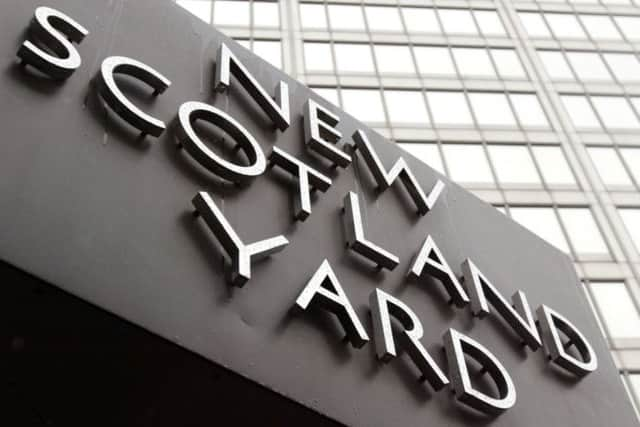Trainee doctor from UK among IS terrorist suspects


One of the suspected extremists is understood to be 21-year-old Tarik Hassane, who lives near Ladbroke Grove in west London.
At least one of the suspects is believed to have travelled to Syria and one line of inquiry is to establish if there are links with Islamic State (IS), the extremist group behind the beheading of British aid workers David Haines and Alan Henning.
Advertisement
Hide AdAdvertisement
Hide AdMr Hassane and three others, aged 20 to 21, were arrested on Tuesday morning in a series of raids at addresses across London, during which one suspect was tasered by police.
Counter-terror officers believe the raids were an “early disruption” of what could have later turned into a “significant plot”, sources said.
In a conversation on social networking site Ask.fm ten months ago, “Tarik Hassane from Ladbroke” claimed to be studying medicine in Sudan after failing to meet the grades for an offer to study at King’s College London.
It is understood that Mr Hassane’s mother is Moroccan and works in a London school.
One neighbour, who did not want to give her name for fear of reprisals, said she had heard that “police took the floor up” in the property. “He was a really nice guy who loved his football,” she said. “He used to be a bit of a Jack the lad but then he kept going to Morocco and around two years ago he started covering his tracksuit with a white dress and then the Jesus creepers came in and he grew a beard. He started behaving shy with people he knew all his life. Everybody noticed it.”
The arrests come less than five weeks after the terror threat level in the UK was raised from substantial to severe, meaning a terrorist attack is “highly likely”.
Yesterday, terrorism experts warned that extremists could be preparing to carry out a beheading on Britain’s streets.
Advertisement
Hide AdAdvertisement
Hide AdA statement from Scotland Yard said all four men were arrested on suspicion of being concerned in the commission, preparation or instigation of acts of terrorism under the Terrorism Act 2000.
A number of residential addresses and vehicles were searched by specialist officers in west and central London. The Yard added: “These arrests and searches are part of an ongoing investigation into Islamist-related terrorism.”
Under terrorism laws, police can hold the men for 48 hours before they have to apply to a magistrate to detain them for longer – but they could be held without charge for up to 14 days.
Metropolitan Police commissioner Sir Bernard Hogan-Howe said: “It is one of a series of arrests that we have had over the last few weeks which taken together for me confirm that the drum beat around terrorism has changed. It’s a more intense drumbeat – we are having to be more interventionist and a lot of it is linked back to Syria and Iraq.”
Terrorism expert Raffaello Pantucci, a director at security thinktank the Royal United Services Institute, said: “The fact these guys are in their twenties suggests more of an IS connection because that is a trait of the organisation. A lot of young people are getting excited about IS. There are some rumours that the plot they were involved in was a beheading of some sort, but that has not been confirmed.
“Certainly the fact the police went to their addresses in the early hours of the morning and used Tasers indicates that they thought this was an active terrorist group, rather than simply fundraisers or sympathisers.”
Foreign Secretary Philip Hammond said yesterday the military response to IS needed to be combined with a political response to combat their “poisonous ideology”. He said the government had “not ruled out” extending airstrikes in Iraq into Syria, but would need parliamentary approval.
SEE ALSO